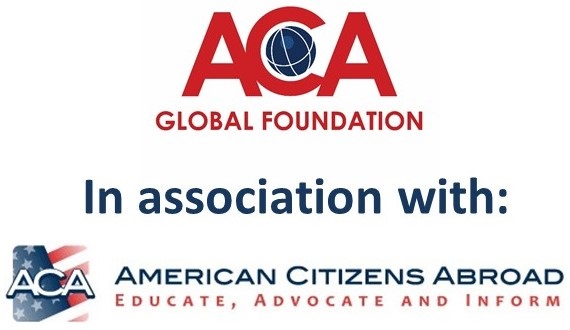
American Citizens Abroad, Inc. (ACA) and American Citizens Abroad Global Foundation (ACAGF) today announced that a detailed analysis of an approach to residency-based taxation (RBT) prepared for ACA has concluded that RBT can be made revenue neutral, that is, it need not cost the Treasury anything in the way it lost revenues.
“While we have thought for some time that this would be the case, we are very pleased to have this confirmed,” said Marylouise Serrato, Executive Director, ACA.
The analysis was prepared by District Economics Group (DEG), a Washington, DC-based economic consulting group, and crowd-funded by ACAGF. Work began in late May 2017 and was completed last weekend. DEG constructed a baseline picture of publicly available data and then analysed the revenue effects of a middle-of-the-road, “vanilla” approach to RBT.
The baseline in several respects is unique, principally because not only does it draw upon previously unavailable information, but it also contains several newly developed data pieces. This significantly advances the analysis of the taxation of Americans overseas.
With RBT, qualified U.S. citizens resident overseas would no longer be subject to U.S. taxation on foreign income. Instead, they would be taxed in much the same way as non-resident foreign individuals. In doing so, the U.S. would follow the same approach as all other countries, with the exception of Eritrea.
The DEG study estimates that a revenue neutral budget score for RBT can be arrived at within the 10-year congressional budget window of 2018 through 2027.
“The analysis of the ACA ‘vanilla’ approach yields a great deal of information about the sensitivities of revenue costs and distributional effects of the various working parts of a RBT proposal. This should prove invaluable for decision-makers,” Charles Bruce, Chairman, ACA Global Foundation. ACA looks forward to presenting, with DEG, these findings to the Joint Committee on Taxation staff and other interested parties on Capitol Hill and at Treasury Department.
“A number of important decision-makers in Congress and the Administration have expressed a desire to address the longstanding problems of the taxation of Americans abroad, at the same time they change the corporate international tax rules, towards territoriality. RBT, intelligently drafted, is now the front-running answer,” said Marylouise Serrato.








